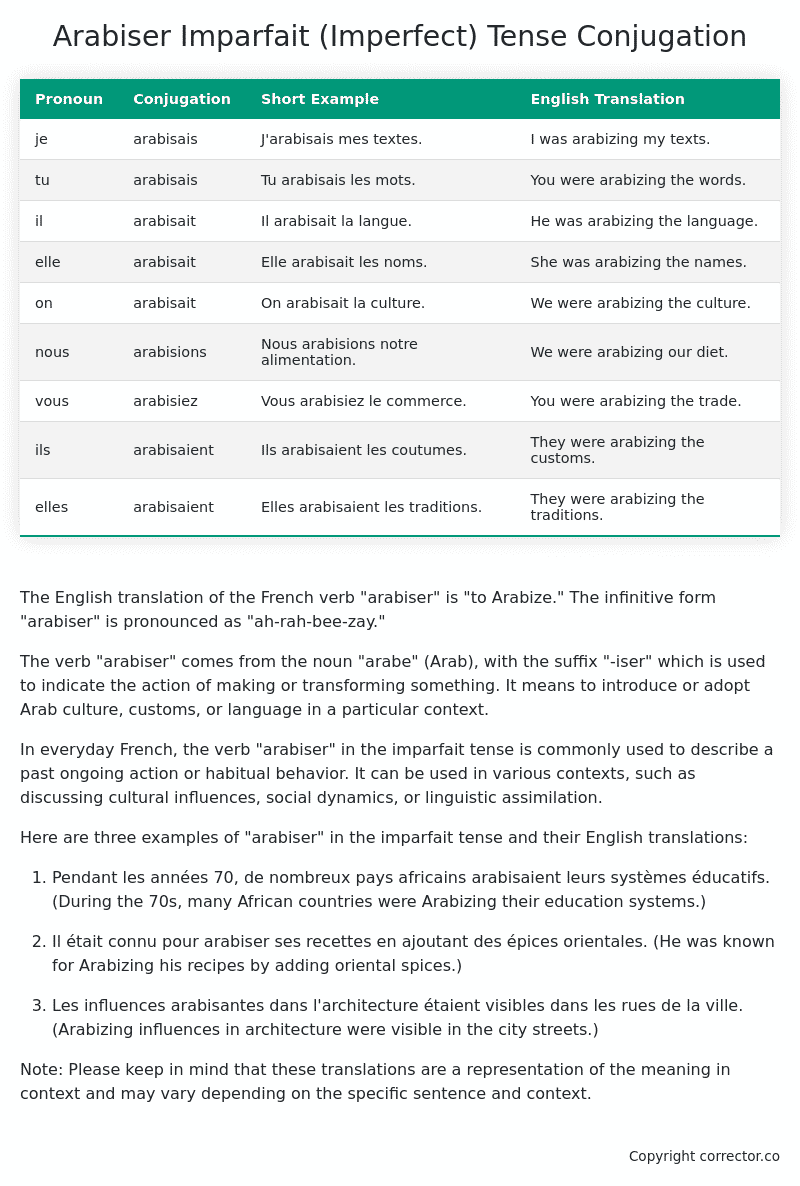Imparfait (Imperfect) Tense Conjugation of the French Verb arabiser
Introduction to the verb arabiser
The English translation of the French verb “arabiser” is “to Arabize.” The infinitive form “arabiser” is pronounced as “ah-rah-bee-zay.”
The verb “arabiser” comes from the noun “arabe” (Arab), with the suffix “-iser” which is used to indicate the action of making or transforming something. It means to introduce or adopt Arab culture, customs, or language in a particular context.
In everyday French, the verb “arabiser” in the imparfait tense is commonly used to describe a past ongoing action or habitual behavior. It can be used in various contexts, such as discussing cultural influences, social dynamics, or linguistic assimilation.
Here are three examples of “arabiser” in the imparfait tense and their English translations:
-
Pendant les années 70, de nombreux pays africains arabisaient leurs systèmes éducatifs. (During the 70s, many African countries were Arabizing their education systems.)
-
Il était connu pour arabiser ses recettes en ajoutant des épices orientales. (He was known for Arabizing his recipes by adding oriental spices.)
-
Les influences arabisantes dans l’architecture étaient visibles dans les rues de la ville. (Arabizing influences in architecture were visible in the city streets.)
Note: Please keep in mind that these translations are a representation of the meaning in context and may vary depending on the specific sentence and context.
Table of the Imparfait (Imperfect) Tense Conjugation of arabiser
| Pronoun | Conjugation | Short Example | English Translation |
|---|---|---|---|
| je | arabisais | J’arabisais mes textes. | I was arabizing my texts. |
| tu | arabisais | Tu arabisais les mots. | You were arabizing the words. |
| il | arabisait | Il arabisait la langue. | He was arabizing the language. |
| elle | arabisait | Elle arabisait les noms. | She was arabizing the names. |
| on | arabisait | On arabisait la culture. | We were arabizing the culture. |
| nous | arabisions | Nous arabisions notre alimentation. | We were arabizing our diet. |
| vous | arabisiez | Vous arabisiez le commerce. | You were arabizing the trade. |
| ils | arabisaient | Ils arabisaient les coutumes. | They were arabizing the customs. |
| elles | arabisaient | Elles arabisaient les traditions. | They were arabizing the traditions. |
Other Conjugations for Arabiser.
Le Present (Present Tense) Conjugation of the French Verb arabiser
Imparfait (Imperfect) Tense Conjugation of the French Verb arabiser (You’re reading it right now!)
Passé Simple (Simple Past) Tense Conjugation of the French Verb arabiser
Passé Composé (Present Perfect) Tense Conjugation of the French Verb arabiser
Futur Simple (Simple Future) Tense Conjugation of the French Verb arabiser
Futur Proche (Near Future) Tense Conjugation of the French Verb arabiser
Plus-que-parfait (Pluperfect) Tense Conjugation of the French Verb arabiser
Passé Antérieur (Past Anterior) Tense Conjugation of the French Verb arabiser
Futur Antérieur (Future Anterior) Tense Conjugation of the French Verb arabiser
Subjonctif Présent (Subjunctive Present) Tense Conjugation of the French Verb arabiser
Subjonctif Passé (Subjunctive Past) Tense Conjugation of the French Verb arabiser
Subjonctif Imparfait (Subjunctive Imperfect) Tense Conjugation of the French Verb arabiser
Subjonctif Plus-que-parfait (Subjunctive Pluperfect) Tense Conjugation of the French Verb arabiser
Conditionnel Présent (Conditional Present) Tense Conjugation of the French Verb arabiser
Conditionnel Passé (Conditional Past) Tense Conjugation of the French Verb arabiser
Conditionnel Passé II (Conditional Past II) Tense Conjugation of the French Verb arabiser
L’impératif Présent (Imperative Present) Tense Conjugation of the French Verb arabiser
L’impératif Passé (Imperative Past) Tense Conjugation of the French Verb arabiser
L’infinitif Présent (Infinitive Present) Tense Conjugation of the French Verb arabiser
L’infinitif Passé (Infinitive Past) Tense Conjugation of the French Verb arabiser
Le Participe Présent (Present Participle) Tense Conjugation of the French Verb arabiser
Le Participe Passé (Past Participle) Tense Conjugation of the French Verb arabiser
Struggling with French verbs or the language in general? Why not use our free French Grammar Checker – no registration required!
Get a FREE Download Study Sheet of this Conjugation 🔥
Simply right click the image below, click “save image” and get your free reference for the arabiser imparfait tense conjugation!

Arabiser – About the French Imparfait Tense
NOTE: To take a deep dive into all the French tenses then see our article on Mastering French Tense Conjugation.
Formation of the Imparfait Tense
For regular -er verbs:
For regular -ir verbs
For regular -re verbs
Common Everyday Usage Patterns
Description of Past Habits
Background Information
Mental and Emotional States
It’s employed to express emotions, thoughts, or physical sensations in the past. For example: “J’étais content quand il est arrivé.” (I was happy when he arrived.)
Ongoing Actions
Points to Note About the Imparfait Tense
Passé Composé vs. Imparfait
Conditional
Si Clauses
Narration
I hope you enjoyed this article on the verb arabiser. Still in a learning mood? Check out another TOTALLY random French verb imparfait conjugation!


